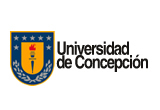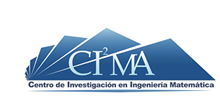News
Event held at the UdeC was part of four meetings organized by Inria-Chile
‘Journées Scientifiques Inria Chile 2023' is the name of a series of scientific meetings organized by Inria Chile, whose closing activity took place at the central campus of the Universidad de Concepción, UdeC.
Among the participants of the event were two members of the Center for Research in Mathematical Engineering, CI²Ma: Mauricio Sepúlveda Cortés and Verónica Anaya Domínguez, academics from the UdeC and the U. del Bío-Bío (UBB), respectively.
In this regard, the director of CI²Ma, Dr. Rodolfo Araya Durán emphasized that “there is a long-standing scientific working relationship with Inria, which is manifested in different academic projects that include members of our center. Another proof of this relationship is the invitation to Dr. Sepúlveda and Dr. Anaya to present their results at this scientific meeting. We hope that in time this relationship can be maintained and deepened”.
Long-standing collaborations and new opportunities
Dr. Sepúlveda commented that he has long maintained collaboration networks with French colleagues and detailed that "I have collaborated for many years with Mostafa Bendahmane from Inria Bordeaux, and now this year 2023 thanks to the sabbatical semester at the University of Concepción and the 7-month stay in France, I also began to work with colleagues from the Inria Saclay center located near Paris, in the MUSCA team led by the researcher Frédérique Clement".
 "This collaboration", he explained, "is part of the associated project ANACONDA- Inria (theoretical and numerical analysis of conservation laws for multicellular dynamics) formed by researchers from the MUSCA team of the Inria Saclay center, the Université d'Orléans and the University of Concepción. It is in this context that Inria Chile contacted me and invited me to participate as an organizing member of the conference held today in Concepción. In addition, I had the opportunity to give a talk in the context of today's event".
"This collaboration", he explained, "is part of the associated project ANACONDA- Inria (theoretical and numerical analysis of conservation laws for multicellular dynamics) formed by researchers from the MUSCA team of the Inria Saclay center, the Université d'Orléans and the University of Concepción. It is in this context that Inria Chile contacted me and invited me to participate as an organizing member of the conference held today in Concepción. In addition, I had the opportunity to give a talk in the context of today's event".
"What I presented", he specified, "was precisely the work that we developed with my collaborators from Inria of Saclay, France, and I invited Professor Verónica Anaya because she also works with researchers from Inria of Bordeaux developing numerical methods for application models of great interest to the participants. She is also the alternate director of a Group Project on desalination, which is a contingent topic of national interest, and she is an emerging researcher with high and growing scientific productivity, so I thought she was an interesting and very appropriate scientist for this conference.
"Although, as researchers, we already have several contacts with French scientists from Inria through ongoing projects," Dr. Sepúlveda explained, "until now there was no formal or working relationship with members of the Inria Chile center, so it is a good opportunity to approach them and see possibilities for collaboration in the immediate future. For me as an applied mathematician, it was nice to meet Inria researchers working in areas that go beyond applied mathematics, numerical methods and scientific calculus in which I am familiar".
"Indeed," the scientist emphasized, "there is new research in digital sciences and technologies with applications in oceanography, ecosystems and astronomy which are topics that involve high-level computation. In addition, there is in Inria Chile knowledge and research in machine learning and Artificial Intelligence that can be a very useful tool to address inverse problems in biology models in which I am currently interested. This is a good opportunity to do interdisciplinary mathematics and collaborate with people from other areas".
.jpg)
In the same way, Dr. Anaya affirmed that "it is interesting to be able to participate because one begins to relate with other sciences, other areas, and it is something important, that is where we are going, it seems to me that is what we should do, instead of being closed in our own area, collaborate with other sciences".
"At least in the area where I am, which is numerical analysis", emphasized the researcher, "we are closer to collaborate with other areas, but it has not been easy, and evidence of that is the project we have, desalination, which has been a bit complicated, but it is an instance to start and hopefully work together, co-direct theses and do more applied things".
"I presented on a finite element method for the Navier-Stokes equations," detailed the also alternate director of the DSALT Group Project on Computational Mathematics for Desalination Problems (ACT 210087). "It is a work that we have with a doctoral student from UBB, on fluid equations that have applications and are in different areas, so we can find problems in common, in which we can then work collaboratively".
 Photo credits: Inria Chile
Photo credits: Inria Chile

